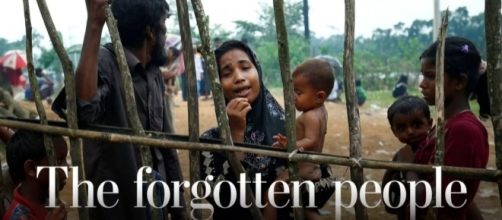A Recent incident on an early morning of August 25, 2017, has given wind to the violence in the Rakhine state of Myanmar. On an early morning, a militant group armed with the small firearms, handheld explosives and machetes attacked over 30 government targets including a border police post. 10 policemen, one soldier, and an immigration official were killed in this attack. 77 insurgents were killed and one insurgent was captured in this attack. Myanmar’s military responded to this attack in the form of a ‘Clearance Operation’ in Rakhine state. There are many questions arising related to this conflict.
For example, who are these Rohingyas? What is this conflict? What is the response of various international organizations like United Nations and the Myanmar Government over this violence?
Players
According to the 2014 census, the total population of Myanmar is about 55,123,814. Buddhists consist of 87.9 percent of this population while Rohingyas represent only 1.7 percent. In Rakhine state, Rohingyas are densely populated. They comprise 42.7 percent part of the total population of Rakhine while Buddhists are at 52.2 percent of the population. Situations of religious tension exist between the two groups.
A group of the al-Yaqeen Faith called the Arakan Rohingya Salvation Army (ARSA), is leading the insurgent movement of Rohingyas.
The leader of ARSA is Attaullah Abu Ammar Jununi. He is Pakistan born and Saudi raised. ARSA claimed the responsibility for the August 25 attack.There are theories claiming that ARSA is backed by terrorist organizations like ISIS and Qaeda. But ARSA denied any such support.
Rohingyas
Rohingyas are ethnic minority group who practice Sufi-inflected Sunni Islam. Approximately 1.1 million Rohingyas reside in Rakhine state. Rohingyas speak Rohingya or Ruaigya, a dialect distinct from other speakers in the Rakhine State. Rohingyas claim that they are the natural inhabitants of Rakhine state. They claim that Rohang derives from the word Arakan in the Rohingya dialect and gya or ga means "from." But Buddhists deny their claim and call them illegal Bengali immigrants.
History of Rohingyas
According to a report by the Human Rights Watch (2000) Rohingyas have been residing in Rakhine state since the 12th century. Reports from various other organizations also claimed the same. These reports do accept that some Buddhists did come as labors from India and Bangladesh during British colonial rule. After the British colonization era, they chose Rakhine State as their permanent home. But Buddhist do not accept these reports, claiming that all the Rohingyas are illegal Bengali immigrants who came to the Rakhine state during British rule - so they are not natural habitats of Rakhine.
The conflict
Rakhine has witnessed a long history of religious conflict. Shortly after independence in 1948 a rebellion broke out along the border of East Pakistan (now Bangladesh) and Myanmar for equal rights for Muslims living in Rakhine state.
After years of insurgency, the government suppressed the violence in 1954. However, the military coup of 1962 in Myanmar hardened the government stance towards them. Now the government considers them (Rohingyas) as a foreign entity and Rohingyas were given foreign identity cards.
A continuous suppression of their rights started under the military regime. The 1982 citizenship act is the dominant cause of the present situation. In this act, the military junta recognized 135 ethnic groups in Myanmar. Rohingyas were not included in this list. because of this, many basic rights were not available for Rohingyas. They were prohibited from occupations related to law and medicine. There were many restrictions on Rohingyas regarding access to food or education.
They are required to obtain the government's no objection certificate to get marriage, to have children, and relocate from one place to other.
Because of this inhumane oppression, many insurgent organizations were born. The Rohingya Solidarity Army and Arakan Rohingya Islamic Front were two of them. In 1998 these two created a loose alliance named Arakan Rohingya National Organization. ARSA was born from this alliance. ARSA has conducted many insurgent acts. October 9, 2016, and the August 25, 2017, attacks are just two of them. The present conflict has roots in a 2012 incident. In 2012, three Rohingya people were accused of rape and killing of a Buddhist woman. In response to this, the Buddhists attacked Rohingyas killing more than 280 people and displaced tens of thousands.
Human Rights Watch called this incident ‘Crimes against humanity’. The same response came from the military after both the October 9, 2016, and August 25, 2017, attacks. In this violence, hundreds of people were killed and millions were displaced.
Where are Rohingyas fleeing to?
As their native country considers them foreign elements, Rohingyas have to migrate to other countries. Their first choice is Bangladesh. They also took shelter in India and the Philippians. Malaysia and Indonesia did not allow them to take shelter but Malaysia provided medicines and food. the UN estimated there are a total of 420,000 refugees and 120,000 internally displaced Rohingyas. During the period of 2012 - 2015, approximately 112,000 fled from Bangladesh to Malaysia.
Around 87,000 fled to Bangladesh between October 2016 and July 2017.
The response of various Organizations
The United Nations has condemned the violence. Former Chief of United Nations, Kofi Annan, suggested settling the violence as soon as possible. Aung San Suu Kyi the de facto leader of Myanmar, is under pressure to resolve the situation as she is being condemned for failing to resolve the Rohingya's oppression by the Government. According to the UN special rapporteur on human rights in Myanmar, Yanghee Lee, Suu Kyi has no access to certain parts of Rakhine and she is allowed to meet only military-approved Rohingya peoples. These restrictions were imposed by the military. In a recent interview, Suu Kyi condemned the violence. But she said that there is huge iceberg of misinformation regarding these incidents. The world community is waiting and hoping for better future for the Rohingyas.


